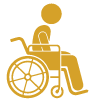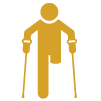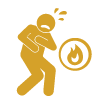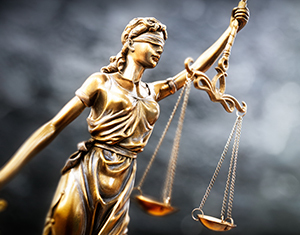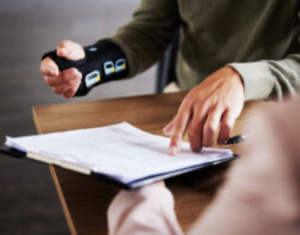An Experienced Auto Injury Attorney for Single Vehicle Accidents in Georgia
Table of Contents
- What Is A Single-Vehicle Car Crash?
- Proving Negligence & Causation in Single-Vehicle Car Accidents
- Who Can Be Held Liable in Single-Vehicle Accidents>
- Compensation & Damages Recoverable in Single-Vehicle Accident Injury Cases
- Types of Injuries Suffered in Single Vehicle Accidents
- Further Reading on Single Vehicle Accidents
Not all car wrecks or accidents involve multiple vehicles. As attentive as we may be, there are times when tragedy may strike. A variety of risks, including weather, avoiding another crash, or simply losing control of your vehicle due to a tire blowout can cause the same injuries as a multi-vehicle accident. These cases have unique elements of recovery that may become more complicated as the case moves forward.
What Is A Single-Vehicle Car Crash?
A single-vehicle car accident is an accident that causes damage to only one car, motorcycle, truck, or other vehicle. A driver may be liable for a single-vehicle accident if their actions are found to be the proximate cause of the crash. Proximate cause means that the driver’s own actions set the events in motion to cause the crash.
Examples of single-vehicle accidents include:
- Running off the road.
- Spinning out without striking anything.
- Hitting something on the side of the road, like a tree or guardrail.
- Flipping over the vehicle.
Although in most cases, drivers are responsible for their single-vehicle accidents, it’s not always the case. There are times that an attentive and conscientious driver might still wind up in a crash. When that happens to you, you may have the right to recover from the responsible party. Knowing your rights after a single-vehicle accident can make all the difference for a victim seeking to build a case.
Further Reading: Legal Help for Distracted Driving Accidents
Proving Negligence & Causation in Single-Vehicle Car Accidents
Many of us assume that in a single-vehicle accident, the driver will be found to be at fault. However, there are instances where a driver in a single-vehicle accident may be found not to be responsible. If issues such as potholes, malfunctioning road signs due to improper road maintenance, or dangerous roadway conditions are found to have contributed to or caused the accident, the driver may have a legal claim against the responsible entity.
In order to prove negligence played a factor in your single-vehicle car accident, your attorney will need to establish the following elements:
- A duty of care existed to the victim, and the defendant owed the victim a level of responsibility.
- The defendant breached the duty of care and responsibility to the victim.
- That breach directly caused the victim’s injuries.
- The victim suffered damages that resulted from the breach of care.
Who Can Be Held Liable in Single-Vehicle Accidents?
Some examples of defendants in a single-vehicle accident case may include:
Employer of the Driver
Under the doctrine of respondeat superior, an employer is responsible for the negligent conduct of an employee who was acting in the course and scope of employment. We see this a lot in truck accident cases. There’s also the possibility an employer may be not just vicariously negligent but directly negligent if, for instance, the company failed to properly vet its employees or required workers to be in constant contact via their smartphones, even while driving. In single-vehicle crashes, we’d see this mostly filed by injured pedestrians, bicyclists, or survivors of those killed. Passengers (assuming they are employees, too) and drivers would most likely be covered via workers’ compensation coverage.
Vehicle Owner
Owners of vehicles can be liable for a crash even if they weren’t the one driving. There’s the family purpose doctrine, which, as noted in 2007 by the Georgia Court of Appeals in Hicks v. Newman, imposes liability for the negligence of an immediate family member using the vehicle for a family purpose when a vehicle is maintained by the owner for the use and convenience of his/her family.
Vehicle owners can also be held liable when they give permission for others to use their car (permissive use doctrine), when they negligently entrust the vehicle to another, knowing they may be a danger on the road (negligent entrustment) and even if they fail to take steps to prevent reasonably foreseeable theft, as the Georgia Court of Appeals established in the 1958 case of Roach v. Dozier.
Bar, Restaurant, Nightclub Owner, Social Host
If an alcohol vendor or social host serves drinks to a person who is either underage or visibly intoxicated, knowing that person is likely to drive from that location, that person/business could be held liable for a single-vehicle crash under Georgia’s dram shop law.
Further Reading: Understanding Georgia’s Modified Comparative Fault Rules in Civil Litigation
Compensation & Damages Recoverable in Single-Vehicle Accident Injury Cases
A variety of injuries occur in single-vehicle car crashes. You may need extensive medical care, or even long-term care after an accident. Fortunately, you may be able to recover some of those losses, including:
- Medical expenses, including emergency care and ongoing treatments.
- Lost wages.
- Reduced or loss of earning capacity.
- Long-term disability.
- Property damage.
- Pain and suffering, including emotional injuries.
- Diminished quality of life.
From whom and exactly how much compensation is due will depend on:
- The circumstances of the crash.
- Whether the at-fault party(ies) had insurance, and if so, what kind and how much.
- The victim’s own insurance.
- The degree to which injured person was at-fault (if any fault was shared).
As you can imagine, your insurance company will do everything it can to lessen the value of your case. They may call you for a statement, monitor your social media, and even send investigators to follow you. To combat this, consult an automobile accident attorney immediately. Additionally, get medical treatment so there are records of the severity of your injuries.
If you or a loved one were injured in a single-vehicle crash, you may be entitled to financial damages. To learn more about what compensation might be available, contact Apolinsky & Associates, LLC, today to schedule your appointment.
Further Reading: Negotiating Insurance Claims for Motor Vehicle Accidents




